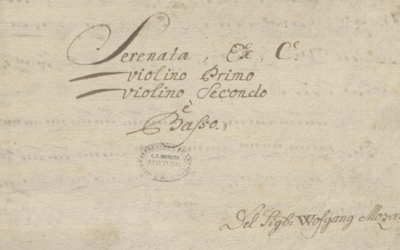The Fiasco of La Finta Semplice
When the Myth Collapsed
Vienna was supposed to be the moment of triumph for young Mozart, the final confirmation of his divine genius. Instead, La Finta semplice turned into an unmitigated disaster, exposing serious flaws in both the music and the myth surrounding its composer. From glaring errors in the Italian text to a score plagued with inconsistencies, the opera quickly fell apart under scrutiny. The Viennese musicians and impresarios were not fooled—Leopold’s carefully constructed image of a miraculous child composer was collapsing before his eyes. To salvage his reputation, Leopold turned to yet another scheme, a Mass performed at Vienna’s orphanage chapel, once again passing off his own corrections as his son’s work. When all else failed, he made a desperate decision: it was time to leave Vienna and head to Italy, the land of opera, in search of redemption.
From Vienna’s Rejection to the Italian Gamble
The Opera That No One Wanted to Sing
The final version of La Finta semplice that survives today is the result of extensive revisions, rehearsals, and repeated copying—evidence that the opera was nowhere near ready when the Mozarts first presented it in Vienna. Even then, the music suffered from clumsy Italian phrasing, awkward doublings, and structural weaknesses.
One particularly humiliating example is the way Wolfgang (or, more likely, Leopold) set the word “amicizia” (friendship), placing the stress on the wrong syllables, resulting in a jarring amìcizìa instead of the correct amicizìa. Similarly, “soddisfazione” (satisfaction) became an unrecognisable soddisfà-zi-o-ne, demonstrating a fundamental misunderstanding of the Italian language.
For professional singers, these were not minor inconveniences—they were career-destroying mistakes. The performers were understandably reluctant to associate themselves with such a flawed production.
Afflisio: The Impresario Who Saw Through the Deception
Viennese impresario Giuseppe Afflisio, known for his shrewd business dealings, immediately recognised that La Finta semplice was unlikely to succeed. The opera’s vocal lines were weak, the instrumentation inconsistent, and the text filled with errors. He realised that Wolfgang was not the sole composer of the work and that Leopold had played a significant role.
Refusing to risk his own reputation, Afflisio rejected the opera outright. When Leopold insisted, Afflisio even threatened to stage La Finta semplice as a parody, turning it into a laughingstock rather than a serious production. The thought of his son being ridiculed was too much for Leopold to bear. He raged in letters, portraying himself as a victim of unjust persecution:
“We are honest people, who proclaim to the world, in honour of their prince and their homeland, a marvel that God caused to be born in Salzburg. I owe this to Almighty God; otherwise, I would be the most ungrateful of His creatures.”
But the Viennese musicians and theatre professionals were not interested in Leopold’s miracles. They demanded results, and the Mozarts had failed to deliver.
“The women of the Mozart household, despite their bitter disappointment, were left behind."
Mozart in Italy
A Desperate Plea to the Emperor—And a Humiliating Rejection
Faced with failure, Leopold resorted to a last-ditch effort: he sent a petition to Emperor Joseph II, along with a catalogue of Wolfgang’s compositions, hoping to secure royal intervention. However, the Emperor was unconvinced.
The investigation into the matter, led by Count Johann Wenzel von Sporck, sided with Afflisio. Contrary to Leopold’s later claims that Sporck had been supportive, the reality was that the petition was rejected outright. The Emperor did not commission any new works, nor did he compensate Leopold for his troubles. In the eyes of Vienna, Leopold Mozart was now a fraud.
The scandal had repercussions beyond Vienna. In Salzburg, Leopold had always presented himself as an esteemed Kapellmeister, but now the Archbishop had reasons to doubt him. Furious at the failure, and perhaps at Leopold’s arrogance in extending his stay, the Archbishop suspended his salary on 18 March 1769.
A Mass to Silence the Critics?
In a desperate attempt to save face, Leopold organised a performance of Missa solemnis K.139 (the “Orphan’s Mass”) in Vienna’s orphanage chapel. The aim was to prove Wolfgang’s divine talent once and for all. But once again, the manuscript tells a different story.
The score is littered with Leopold’s handwriting—corrections, adjustments, even entire passages that he clearly modified. The orchestration shows his intervention, and even the Latin text contains mistakes. Misplaced syllables, incorrect instrument markings (“trombone 1mo, 2do, and 3tia” instead of “trombone primo, secondo e terzo”), and laughable errors such as in carnatus instead of incarnatus expose the truth: Leopold was still shaping his son’s compositions behind the scenes.
The Final Blow: A Forced Return to Salzburg
The failure of La Finta semplice marked the end of Wolfgang’s time in Vienna. The Mozarts were left with no choice but to return to Salzburg in disgrace. Even worse, Leopold’s attempts to present himself as a major European figure had backfired. His correspondence with Johann Lorenz Hagenauer reveals his growing frustration:
- The Emperor had rejected his petition.
- The Archbishop had cut off his salary.
- La Finta semplice was a failure.
Salzburg, a city that Leopold had long despised, was now the only place they could go. However, he had already set his sights on a new goal—an escape route from his provincial post.
The Italian Gamble: A New Scheme Begins
Leopold had long dreamed of taking Wolfgang to Italy, the land of opera. He had already begun securing letters of recommendation from influential figures, including Emperor Joseph II himself, for Florence, Naples, and other imperial territories.
The Italian tour was no longer a vague ambition—it was a necessity. If Leopold was to restore his son’s reputation, he had to stage a new performance in the heart of the operatic world. There, he believed, Wolfgang could finally be accepted as a serious composer.
The Sacrifice of Nannerl and Anna Maria
One crucial decision had to be made before their departure. The entire family could not afford to travel, and Leopold saw little value in bringing his wife and daughter along.
By late 1769, Nannerl was 18—too old to be presented as a child prodigy. She was instead tasked with staying behind in Salzburg to give harpsichord lessons and support the household. Anna Maria, too, was forced to remain, reduced to waiting for Leopold’s letters from afar.
Wolfgang, on the other hand, was nearly 14, but his small stature allowed his father to continue pretending he was younger—a deception that would be useful in Italy.
On 27 November 1769, with the Archbishop’s reluctant blessing and a grant of 120 ducats, father and son set off for Italy. The women of the Mozart household, despite their bitter disappointment, were left behind.
A New Beginning—Or Another Myth in the Making?
Leopold’s relentless ambition had led them to Vienna, where the Mozart legend had been shattered. Now, he pinned all his hopes on Italy. Would Wolfgang finally prove himself, or would history repeat itself?
For more revelations on the Mozart family’s hidden history, read Mozart in Italy—a groundbreaking investigation into the myths and realities behind one of history’s most manipulated musical figures.
📖 Mozart in Italy: Available now!
You May Also Like
#4 The Golden Spur
While often portrayed as a prestigious award, the Golden Spur (Speron d’Oro) granted to Mozart in 1770 was far from a reflection of his musical genius. In this article, we delve into the true story behind this now-forgotten honour, its loss of value, and the role of Leopold Mozart’s ambitions in securing it.
Mozart Unmasked: The Untold Story of His Italian Years
Explore the lesser-known side of Wolfgang Amadé Mozart’s early years in Italy. ‘Mozart in Italy’ unveils the complexities, controversies, and hidden truths behind his formative experiences, guided by meticulous research and rare historical documents. Delve into a story that challenges the traditional narrative and offers a fresh perspective on one of history’s most enigmatic composers.
Another Example of Borrowed Genius
The myth of Mozart’s genius continues to collapse under the weight of his reliance on others’ ideas, with Leopold orchestrating his son’s supposed early brilliance.
A Genius or a Patchwork?
The genius of Mozart had yet to bloom, despite the anecdotes passed down to us. These concertos were not the work of a prodigy, but a collaborative effort between father and son, built on the music of others.
Myth, Reality, and the Hand of Martini
Mozart handed over Martini’s Antiphon, not his own, avoiding what could have been an embarrassing failure. The young prodigy had a lot to learn, and much of what followed was myth-making at its finest.
Mozart’s Serenade? A New Discovery? Really?
In Leipzig, what was thought to be a new autograph of Mozart turned out to be a questionable copy. Why are such rushed attributions so common for Mozart, and why is it so hard to correct them when proven false?







